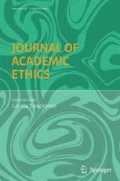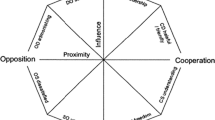Abstract
This study investigated students’ (n = 819) perceptions following a prepared, common presentation regarding academic integrity provided by their residence dons. This peer instruction study utilized both quantitative and qualitative analyses of survey data within a pre-test post-test design. Overall, students reported gains in knowledge, as well as confidence in their knowledge of academic integrity. Notably, students reported increases in their personal value for academic integrity after participating in the presentations. Overall, the quality and content of the presentations were judged positively, and participants’ ratings of the presentation were predictive of increases in personal value of academic integrity, as well as self-reported knowledge and confidence gains. Qualitative analyses supported that the key ideas in the presentation served as the focal material for discussion, but also introduced specific topics that students wanted to explore in greater depth.
Similar content being viewed by others
Notes
Before conducting regression analyses, correlations were conducted between the confidence and knowledge measures prior to the presentation and then after the presentation. In both cases the correlations were very high (r (806) = .79 and r (804) = .74 before and after the presentation respectively). Such high correlations suggest that these measures were consistently assessing the same underlying construct. These two scales were combined to form an aggregated confidence and knowledge scale prior to the presentation and an aggregated confidence and knowledge scale after the presentation. Cronbach’s test of reliability suggest that the scales were highly reliable (α = .92 prior to presentation and .94 after the presentation. All analyses for students employed the aggregated measures.
References
Baetz, M., Wood, E., Zivcakova, L., Nosko, A., De Pasquale, D., & Archer, K. (2011). Encouraging active classroom discussion of academic integrity and misconduct in higher education business contexts. Journal of Academic Ethics, 9(3), 217–234.
Balfakih, N. M. A. (2003). The effectiveness of Student Team-achievement Division (STAD) for teaching high school chemistry in the United Arab Emirates. International Journal of Science Education, 25(5), 605–624.
Bean, D. F., & Bernardi, R. A. (2005). Accounting ethics courses: a professional necessity. The CPA Journal, 75(12), 64–65.
Bertram Gallant, T., & Drinan, P. (2008). Toward a model of academic integrity institutionalization: informing practice in postsecondary education. The Canadian Journal of Higher Education, 38(2), 25–44.
Boehm, P. J., Justice, M., & Weeks, S. (2009). Promoting academic integrity in a higher education context. The Community College Enterprise, 15(1), 45–61.
Brandt, D. S. (2002). Copyright’s (not so) little cousin, plagiarism. Computers in Libraries, 22(5), 39–42.
Brown, C. A., & McIlroy, K. (2011). Group work in healthcare students’ education: what do we think we are doing? Assessment & Evaluation in Higher Education, 36(6), 687–699.
Chapman, H. (2005). Towards effective group-work in nurse education. Nurse Education Today, 26, 298–303.
Christensen Hughes, J. M., & McCabe, D. L. (2006). Academic misconduct within higher education in Canada. The Canadian Journal of Higher Education, 2, 1–21.
Compton, J., & Pfau, M. (2008). Inoculating against pro-plagiarism justifications: rational and affective strategies. Journal of Applied Communication Research, 36(1), 98–119.
Ellery, K. (2008). Undergraduate plagiarism: a pedagogical perspective. Assessment & Evaluation in Higher Education, 33(5), 507–516.
Feldman, S., Anderson, V., & Mangurian, L. (2001). Teaching effective scientific writing: refining students’ writing skills within the Towson transition course. Journal of College Science Teaching, 30, 446–449.
Fraser, S. C., Beaman, A. L., Diener, E., & Kelem, R. T. (1977). Two, three, or four heads are better than one: modification of college performance by peer monitoring. Journal of Educational Psychology, 69(2), 101–108.
Goldschmid, B., & Goldschmid, M. (1976). Peer teaching in higher education: a review. Higher Education, 5, 9–33.
Howard, R. M. (2002). Don’t Police plagiarism: just teach! Education Digest, 67(5), 46–50.
Kidwell, L. A., & Kent, J. (2008). Integrity at a distance: a study of academic misconduct among university students on and off campus. Accounting Education: An International Journal, 17, S3–S16.
Landau, J. D., Druen, P. B., & Arcuri, J. A. (2002). Methods for helping students avoid plagiarism. Teaching of Psychology, 29, 112–115.
Lawton, K. A., & Cousineau, L. (2001). Plagiarism: Its nature and consequences. From The University Writing Program, Guide to Library Research” (Duke University Libraries, August 29, 2001). Available online at http://www.lib.duke.edu/libguide/plagiarism.htm. Accessed 2 July 2012.
Martin, J., & van Haeringen, K. (2011). Can a policy change practice? an evidence-based approach to developing policy. International Journal for Educational Integrity, 7(2), 13–22. ISSN 1833–2595.
McCabe, D. L. (2005). Academic dishonesty & educational opportunity. Liberal Education, 91(3), 26–31.
McCabe, D. L., Trevino, L. K., & Butterfield, K. D. (2001). Cheating in academic institutions: a decade of research. Ethics & Behavior, 11(3), 219–232.
Nordberg, D. (2008). Group projects: more learning? less fair? a conundrum in assessing postgraduate business education. Assessment & Evaluation in Higher Education, 33(5), 481–492.
Payne, B., Monk-Turner, E., Smith, D., & Sumter, M. (2006). Improving group work: voices of students. Education, 126, 441–448.
Postholm, M. (2008). Group work as a learning situation: a qualitative study of a university classroom. Teachers and Teaching, 14, 143–155.
Roig, M. (2001). Plagiarism and paraphrasing criteria of college and university faculty. Ethics and Behavior, 11(3), 307–323.
Schrimsher, R. H., Northrup, L. A., & Alverson, S. P. (2011). A survey of Samford university students regarding plagiarism and academic misconduct. The International Journal for Educational Integrity, 7(1), 3–17.
Sherman, L. W., & Thomas, M. (1986). Mathematics achievement in cooperative versus individualistic goal-structured high school classrooms. Journal of Educational Research, 79, 169–172.
Slavin, R. E. (1990). Research on cooperative learning: consensus and controversy. Educational Leadership, 47(4), 52–54.
Soto, J. G., Anand, S., & McGee, E. (2004). Plagiarism avoidance: an empirical study examining teaching strategies. Journal of College Science Teaching, 33, 42–48.
Strauss, A., & Corbin, J. (1990). Basics of qualitative research: grounded theory procedures and techniques. Newbury Park: Sage.
Topping, K. J. (2005). Trends in peer learning. Education Psychology, 25(6), 631–645.
Topping, K. J., Thurston, A., Tolmie, A., Christie, D., Murray, P., & Karagiannidou, E. (2011). Cooperative learning in science: intervention in the secondary school. Research in Science & Technological Education, 29(1), 91–106.
Vygotsky, L. (1978). Interaction between learning and development (pp. 79–91). In Mind in Society. (Trans. M. Cole). Cambridge, MA: Harvard University Press.
Wojtas, O. (1999). Accused students claim they ‘cooperated’ not collaborated. Times Higher Education Supplement, 27 August, p. 36.
Zivcakova, L., Wood, E., Baetz, M., & De Pasquale, D. (2012a). How do faculty members respond to their students’ discussions of academic misconduct and academic integrity? International Journal for Educational Integrity, 8(1), 25–40. ISSN 1833-2595.
Zivcakova, L., Wood, E., Forsyth, G., Dhillon, N., Ball, D., Corolis, B., et al. (2012b). Examining the impact of dons providing peer instruction for academic integrity: Dons’ and students’ perspectives. Journal of Academic Ethics, 10(2), 137–150. doi:10.1007/s10805-012-9153-8.
Zivcakova, L., Wood, E., Forsyth, G., Zivcak, M., Shapiro, J., Angardi, V., Coulas, A., Daniels, S., & Linseman, A. (2013). Examining the impact of uniform academic integrity presentations delivered by residence dons. Sydney: 6APCEI. From Policy to Practice – Bridging the Gap. A Collection of Talks. Abhaya Nayak & Saddiqui Sonia (Eds.)
Acknowledgement
The researchers would like to acknowledge the contributions of Joshua Manuel and Olivia Saccucci regarding the presentations used in this research and the Residence Life Area Coordinators, especially Josh Duarte, for their support and assistance with data collection. Also, we thank Dr. Deborah McClatchy, VP: Academic, for her commitment to this research and financial support.
Author information
Authors and Affiliations
Corresponding author
Rights and permissions
About this article
Cite this article
Zivcakova, L., Wood, E., Forsyth, G. et al. Investigating Perceptions of Students to a Peer-Based Academic Integrity Presentation Provided by Residence Dons. J Acad Ethics 12, 89–99 (2014). https://doi.org/10.1007/s10805-014-9206-2
Published:
Issue Date:
DOI: https://doi.org/10.1007/s10805-014-9206-2




